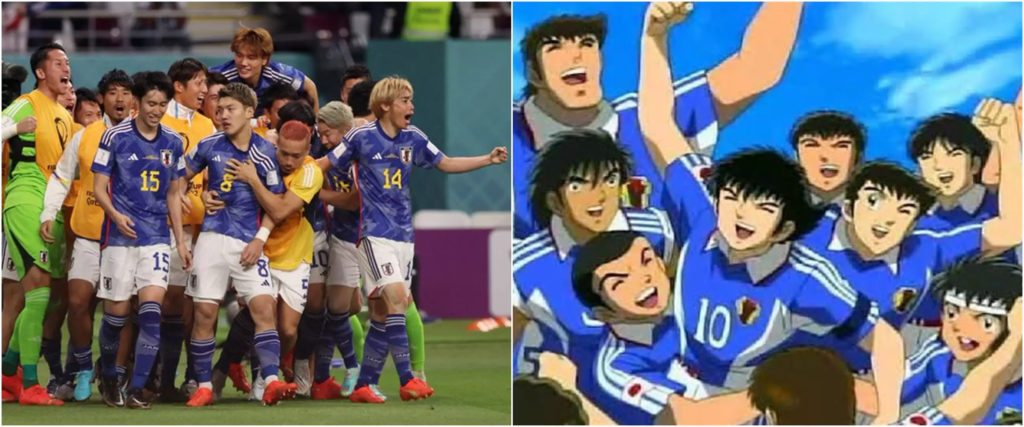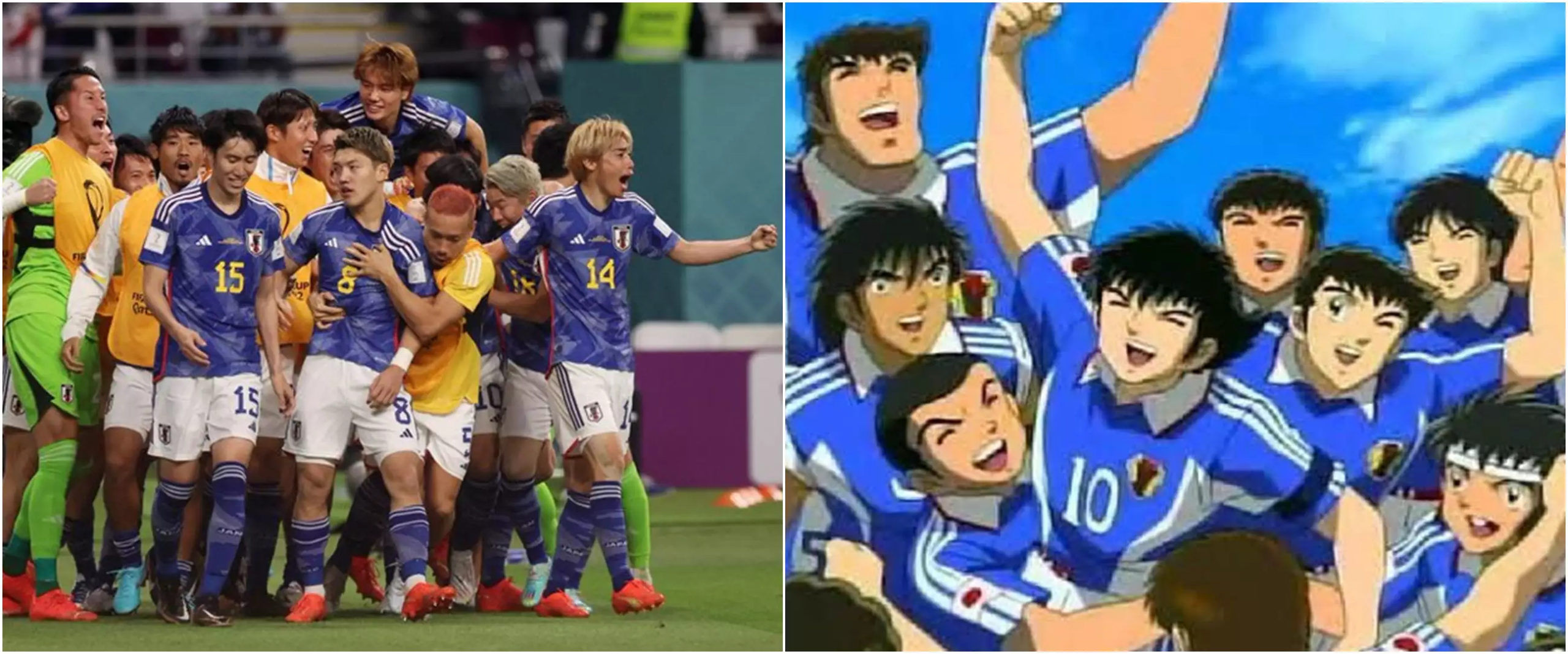by Kaori Shoji
When the professional soccer league of Japan aka ‘J-League’ officially came into existence in 1993 it was a huge deal. Suddenly, everyone was talking about rules and bandying about phrases like ‘offside’ and ‘middle shoot.’ Suddenly, soccer players – from 13-year olds dutifully kicking the ball around on their school grounds during their extra-curriculars, to bona fide club players with their own harem of groupies (that’s what they were called back then) – were sizzling hot. Everyone it seems, wanted to be them, date them or use them for some kind of leverage. In the early naughts an older co-worker sidled up to me one afternoon in the company corridor and told me with a mix of swagger and sincerity that if I played my cards right, ie., slept with him–he was willing to take me to a J-league game. We could watch Kazuyoshi Miura who at the time, was playing for Vissel Kobe. I recall taking a full 2 minutes before coming to my senses and declining politely. What can I say, tickets for a J-League game were impossible to get and prohibitively expensive. Two minutes mulling it over was allowed, right?
Kazuyoshi Miura’s name still strikes a chord with many Japanese regardless of their level of soccer passion. In our collective consciousness he was the first Japanese guy to leave these shores on his own and make a lasting, positive impact on the international pitch.

Now, more than 300 Japanese players are spread out over 57 nations across the globe. Seventy-four of them play for Europe’s most prestigious clubs. Nearly every one of them are English speakers and a sizable number can even give interviews. Not so in the 1990s when Miura was making his presence felt. Japanese men’s reputation overseas was dismal. They were deemed bad at communication, self-assertion, personal grooming. They hovered between bad and awful on the dating scale. Japanese soccer was dismal. The team seemed to have little strategy other than passing the ball around like a hot potato, waiting for something to give. It wasn’t until 1998 that Japan qualified to play in the World Cup. In 2002 when the host countries were Japan and South Korea, we made it to the knockout stage for the first time ever.
Miura enjoyed being called ‘Kazu’ for most of his career but for the past decade he has insisted on the alias of ‘King Kazu.’ At 55, he’s the world’s oldest professional player and has a spot in the Guinness Book of World Records. Last year he scored a goal in a J-1 match, among players less than half his age.
Miura was the first Japanese soccer player with guts and bravado and a mouth to match his outsized ego. At his favorite cafe in Omotesando, the baristas have strict orders to inscribe ‘King Kazu’ on his customized lattes and god forbid they should ever forget. He never had the suave sophistication of Cristiano Ronaldo but he knew what it meant to be assertive on the global stage, how being hot was almost the equivalent of having talent, on or off the pitch. Kazu was the first Japanese male to show us that the worth of a Japanese male didn’t have to be found in stupidly long working hours but having a good time and looking great. His message was electrifying and soccer fans or not, we were hooked.
Fast forward to 2022 and the World Cup in Qatar. If you’re anything like me the World Cup takes over a huge chunk of your waking hours or in this case, the hours (12 midnight and 4AM specifically) when people are usually in their beds. The day after a Japan game, the people I met at work walked around like zombies, bumping into file cabinets and yawning behind their masks. We would rub our eyes, laugh together and share that special rush of adrenaline shared by soccer fans. We won! We won!
Call it escapism, defeatism, a refusal to face my personal problems. Call it what the hell you like, just don’t come between me and my game. When it comes to soccer, my mindset is similar to Renton’s in Trainspotting when he says “Whew! I haven’t felt that good since Archie Gimmell scored against Holland in 1978!”
I only know Archie Gimmell from news archives but I feel the exact say way about Ritsu Doan who, on December 1st 2022, scored a goal against Spain that ultimately led Japan to the knock out stage. Spain! Let me repeat, that’s Spain, the country that won the World Cup in 2010 and owns the best club teams in the world. And before that, in the first game in the group league, Japan beat Germany in what can only be described as a miraculous wet dream come true.
That kind of rush is rare though it’s just a thin trickle of joy compared to how Doan felt when he scored that goal. In a time-freeze, parallel, reincarnated universe (I have no idea what this means other than it sounds right) I am a 24-year old Japanese soccer player, beautiful and slender, with dyed blonde hair and no tattoos and impeccable locker room manners and a disarming, lopsided smile I reserve for my girlfriend and mom.
I don’t see myself as a forward. No, I think I’m a center mid-fielder who shoots out like a star when the going gets tough and work my magic to turn the game around. I am there, in Qatar. Every single fiber of my body is concentrating on the ball and the geometry of connecting the passes to outwit the enemy, pushing the game to gain a little more distance and secure a little more space. I can feel every stride of my long legs as the ball jumps and rolls just a few feet away. I can hear the crowds scream and cheer in ecstasy. It’s in this moment that I know – there is nothing else than this and nothing else matters. I know, with a shock of unwavering certainty, that this is what I exist for and what I’m meant to do with my one wild and precious life.
Of course I know it’s futile to try and coax non-soccer enthusiasts to enter this zone. Jake Adelstein, who owns and runs this site and who very, very reluctantly agreed to assign this essay, said: “Who cares about the World Cup? I think it’s a sham. You better hand this in before the year is out because in a few more weeks it will be a distant memory, if that.” (Editor’s note: Did this happen in the same year as the 2020 Olympics? I can’t remember anymore)
But. And still. My retort is that if the World Cup is a sham, it’s a gorgeous one. Let me turn a blind eye to the white supremacist bullshit that reigns inside FIFA despite the fact that the majority of the most talented players are people of color. Or the fact that Qatar built its stadiums literally on the backs of imported slave laborers and has a financial vice-grip on some of Europe’s most revered club teams. Or that events like the World Cup and the Olympics are notorious for leaving behind a legacy of corrupted officials and ecological disasters. Football is a bad match with anything else. Any discussion other than the game and the players can lead to violence or destroyed relationships.
As a Japanese, I’m privileged in that my country’s brand of soccer has been linked more to pop culture than politics. To the majority of Japanese over 15 and under 60, soccer will always be tied to the manga/anime series Captain Tsubasa penned by Yoichi Takahashi, in which the sweet, clear-eyed titular characters’s signature line is: “The ball is my friend!” After delivering this line Tsubasa runs onto a pitch that’s always green, under a sky that’s forever blue and cloudless.
(Editor’s note: “The ball is my friend“? Only makes sense if Tsubasa had monorchism, or a terrbile soccer injury?)
Captain Tsubasa convinced generations of Japanese kids that playing soccer was a worthy life endeavor if not the only thing in their lives that will remain pure and unsullied well into adulthood. That’s a mirage in the desert but I know more than a few men who refer to CTsubasa as the series is affectionately called, as the one manga that saved them in their darkest hours.
With the World Cup in Qatar it was Blue Lock, the definitive modern soccer manga now turned into an anime series, that so far has sold over 16 million copies. “Blue Lock” is much more attuned to today’s soccer and the World Cup than Captain Tsubasa–less innocent and more pragmatic. The author Muneyuki Kinjyo stresses that soccer calls for only one thing: victory. And for Japan to get past the knockout stage, the team must want that win and sacrifice everything to get it, even their personal integrity. This stuff moves me to tears, in much the same way that Maya Yoshida, captain of the Japan team, said in an interview after the win over Germany: “We’re here to win. That’s all we’re thinking about right now.”
For many Japanese, soccer and soccer manga run together on the same pitch. The teams and players blur and blend into each other in a glorious, nerdy, pop-culture experience that has nothing to do with Hollywood and everything to do with growing up in Japan. This is ours. And we’ve finally come to a point where it’s okay to let it all hang out.
